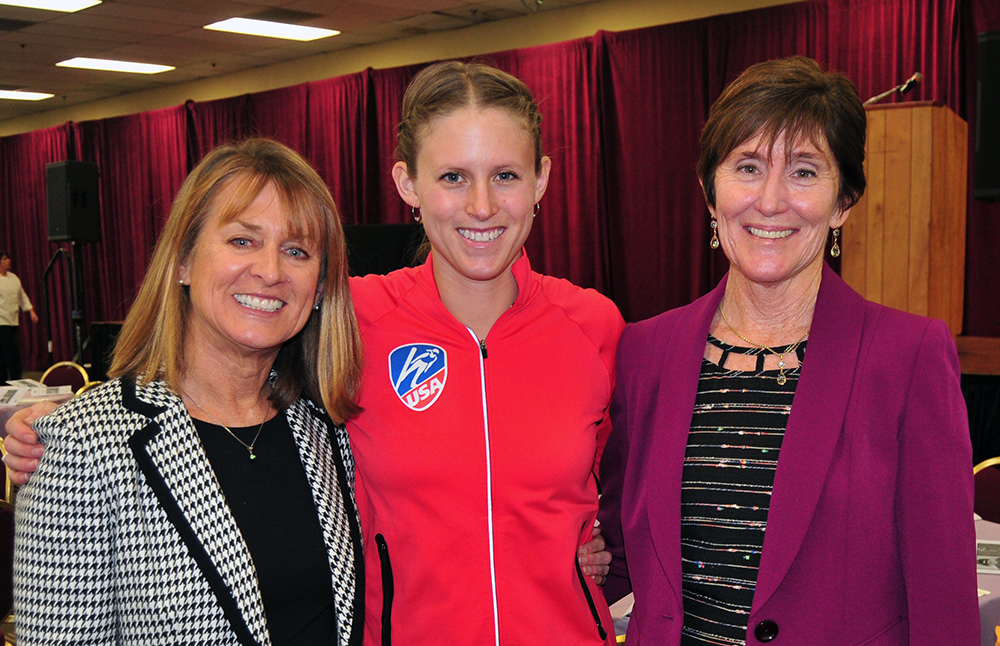
Santa Barbara Athletic Round Table president Laurie Leighty, left, Alissa Johnson, center, and WISL committee chair Catharine Manset.
The Santa Barbara Athletic Round Table brought together women’s Olympic Ski Jumping, Title IX legislation and Jenny Schatzle on Monday. It was a Tour de Force for the annual Women in Sports Luncheon at Earl Warren Showgrounds.
Hundreds of local female student-athletes were at the annual WISL, created by the Round Table to celebrate the legacy of Title IX, a law enacted in 1972 that helped establish more opportunities for women in athletics. Professional ski jumper Alissa Johnson was flown in from Park City, Utah as an example of women continuing the fight for equal opportunity in sport.
Johnson and her U.S. Ski Team teammates successfully campaigned to have women’s ski jumping become an Olympic sport in 2014. But it took 10 years and there was remarkable resistance from the male establishment during the process. The movement was made into a documentary film called “Ready to Fly,” available on Netflix.
Johnson, 27, said it’s made her very conscious of the not-so-distant past.
“We really have a strong group of women that left that for us, and it’s something that I hope none of you have to experience in your life because it’s a hard struggle when you’re told you can’t do some things simply based on the fact that you look different anatomically,” Johnson said.
“We have a lot to thank for that generation that brought NCAA sports and the fact that we can now go out and pursue our dreams and get athletic scholarships.”
But for Johnson, it was the adrenaline of the ski jump ramp descent followed by a soaring flight lasting hundreds of feet that captivated her spirit. She was a promising swimmer but dropped it at age 14 to focus on ski jumping.
“I knew I could go to college if I just kept with swimming but I just didn’t love it the same way I loved ski jumping,” said Johnson, who encouraged the young athletes in the audience to pursue athletics if that was their dream.
She said it wasn’t until the Winter Olympics came to Salt Lake City in 2002 did it register with her that women ski jumpers couldn’t compete even though they could jump just as far as the men and had a history of jumping that dated back to the 1800s.
By 2006 Johnson was part of a team working towards the goal of seeing women jump in the Olympics, but it would take eight more years to realize their goal. Seeing her brother make the U.S. Team for the 2006 Turin Games and the 2010 Vancouver Games gave her mixed emotions.
“Just seeing at the time I was higher ranked in the world than my brother, I love him dearly but it was very bittersweet knowing that I should have been there and I had a chance at an Olympic medal,” Johnson said. “But I wasn’t given it just because I was a female.”
Johnson’s jumping took her to 26 countries and she recorded 16 top-30 finishes on the World Cup circuit in 2012 and 2013. One time in Norway, Johnson competed in front of 100,000 people.
But never the Olympics. She just missed qualifying in 2014 and isn’t sure about another try in 2018.
Johnson sat on stage with Catherine Remak and told her story through a Q&A format.
Just before, local fitness personality Jenny Schatzle perked up the crowd with a quick session of “quick feet.” The entire room was asked to stand up and do the exercise in order to keep the blood flowing during the lunch hour.
Round Table President Laurie Leighty and WISL Committee Chair Catharine Manset also spoke, thanking sponsors and committee members for organizing the event.
